Operations Management Case: Addressing Tesla's Quality Challenges
VerifiedAdded on 2023/06/10
|6
|1508
|487
Case Study
AI Summary
This case study analyzes the quality challenges faced by Tesla Motors, particularly with the launch of the Model 3 electric car. Despite receiving numerous reservations, Tesla has struggled with managing the quality of its cars, facing mechanical and software issues. The case discusses consumer reports advising against purchasing new cars in their first year of production, especially those with innovative technology, and refutes this recommendation, highlighting Tesla's commitment to innovation and customer satisfaction. Elon Musk's leadership and the company's proactive approach to replacing faulty cars are also examined. The study concludes that Tesla should focus on improving quality control and customer support to maintain its reputation and effectively address the challenges it faces, while continuing to innovate and prioritize customer satisfaction. Desklib provides students access to similar case studies and assignments.
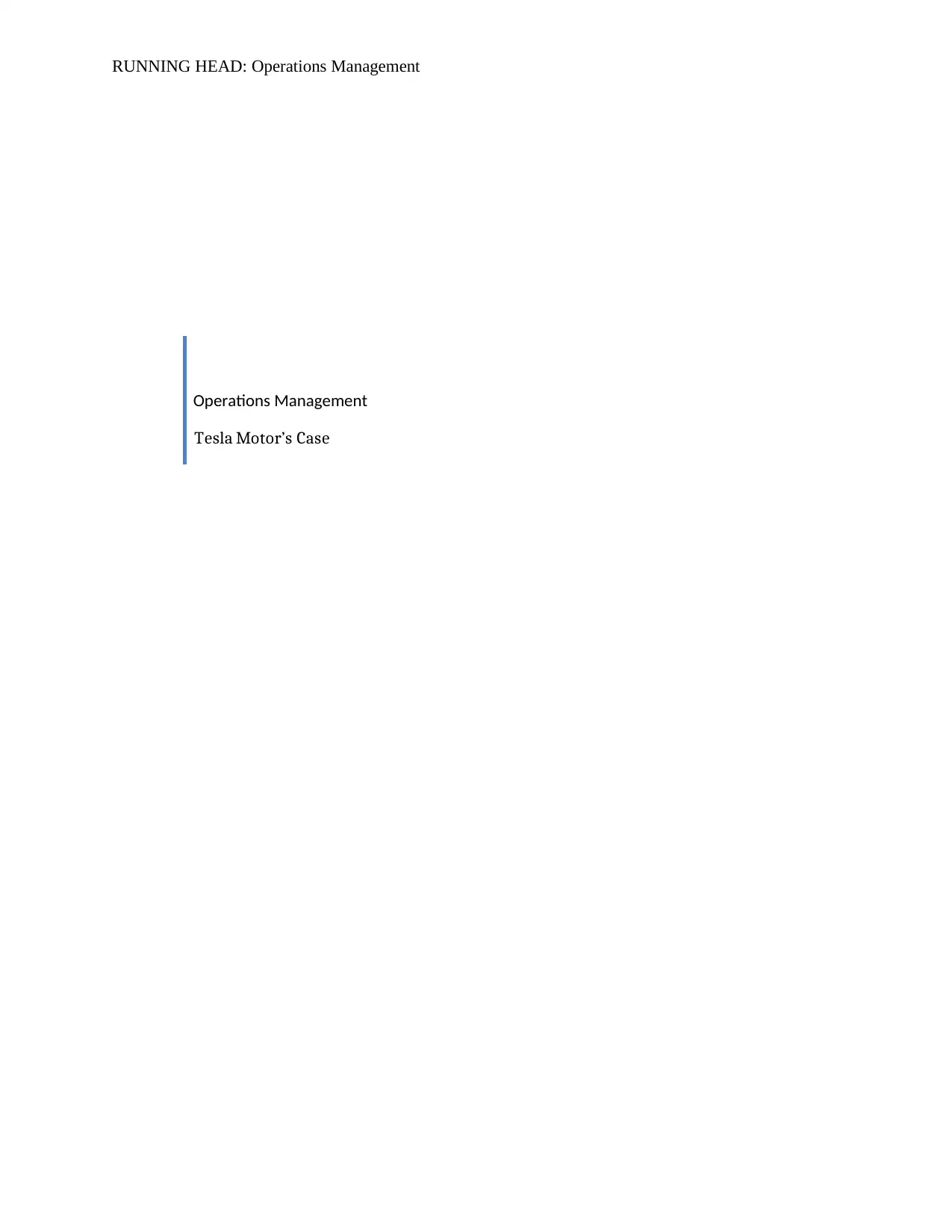
RUNNING HEAD: Operations Management
Operations Management
Tesla Motor’s Case
Operations Management
Tesla Motor’s Case
Paraphrase This Document
Need a fresh take? Get an instant paraphrase of this document with our AI Paraphraser
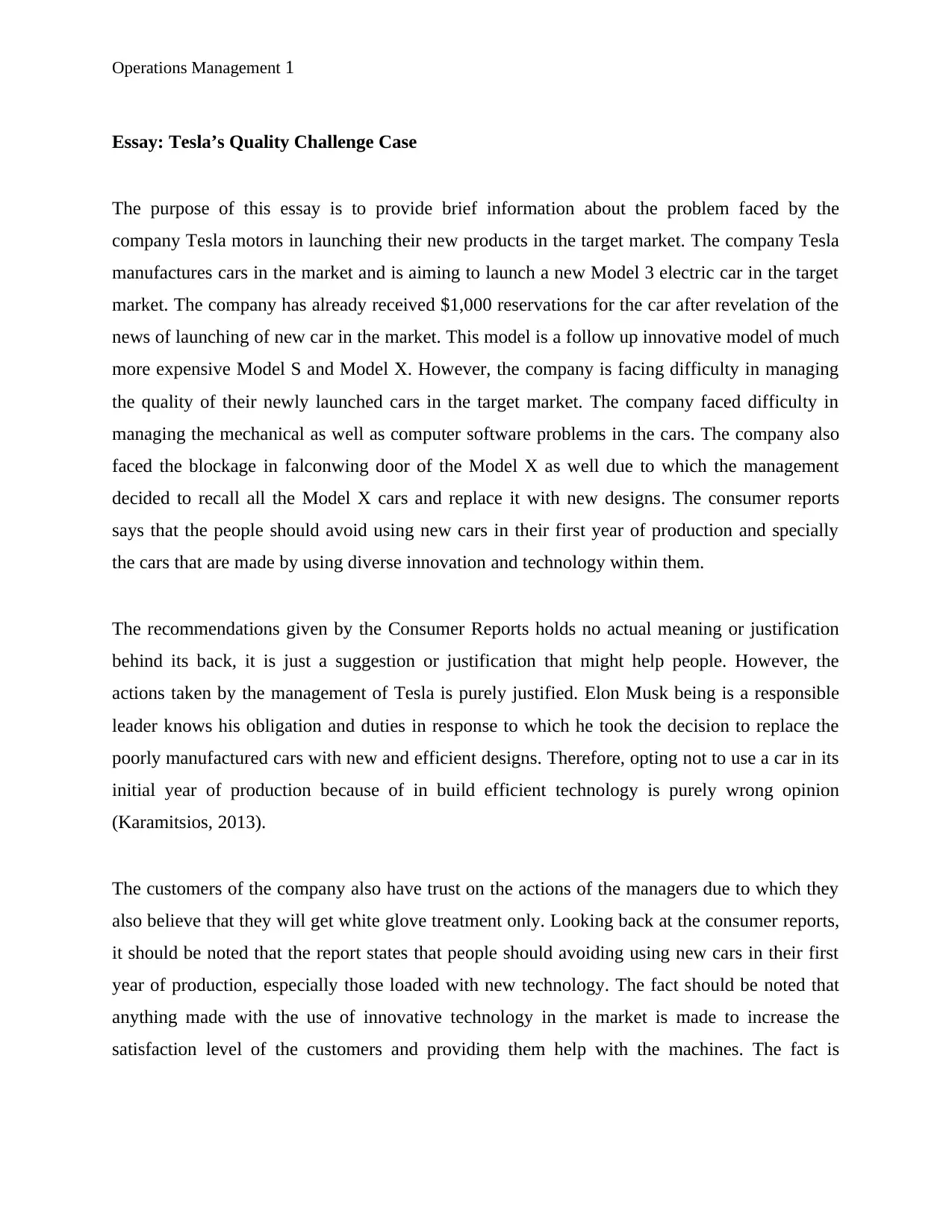
Operations Management 1
Essay: Tesla’s Quality Challenge Case
The purpose of this essay is to provide brief information about the problem faced by the
company Tesla motors in launching their new products in the target market. The company Tesla
manufactures cars in the market and is aiming to launch a new Model 3 electric car in the target
market. The company has already received $1,000 reservations for the car after revelation of the
news of launching of new car in the market. This model is a follow up innovative model of much
more expensive Model S and Model X. However, the company is facing difficulty in managing
the quality of their newly launched cars in the target market. The company faced difficulty in
managing the mechanical as well as computer software problems in the cars. The company also
faced the blockage in falconwing door of the Model X as well due to which the management
decided to recall all the Model X cars and replace it with new designs. The consumer reports
says that the people should avoid using new cars in their first year of production and specially
the cars that are made by using diverse innovation and technology within them.
The recommendations given by the Consumer Reports holds no actual meaning or justification
behind its back, it is just a suggestion or justification that might help people. However, the
actions taken by the management of Tesla is purely justified. Elon Musk being is a responsible
leader knows his obligation and duties in response to which he took the decision to replace the
poorly manufactured cars with new and efficient designs. Therefore, opting not to use a car in its
initial year of production because of in build efficient technology is purely wrong opinion
(Karamitsios, 2013).
The customers of the company also have trust on the actions of the managers due to which they
also believe that they will get white glove treatment only. Looking back at the consumer reports,
it should be noted that the report states that people should avoiding using new cars in their first
year of production, especially those loaded with new technology. The fact should be noted that
anything made with the use of innovative technology in the market is made to increase the
satisfaction level of the customers and providing them help with the machines. The fact is
Essay: Tesla’s Quality Challenge Case
The purpose of this essay is to provide brief information about the problem faced by the
company Tesla motors in launching their new products in the target market. The company Tesla
manufactures cars in the market and is aiming to launch a new Model 3 electric car in the target
market. The company has already received $1,000 reservations for the car after revelation of the
news of launching of new car in the market. This model is a follow up innovative model of much
more expensive Model S and Model X. However, the company is facing difficulty in managing
the quality of their newly launched cars in the target market. The company faced difficulty in
managing the mechanical as well as computer software problems in the cars. The company also
faced the blockage in falconwing door of the Model X as well due to which the management
decided to recall all the Model X cars and replace it with new designs. The consumer reports
says that the people should avoid using new cars in their first year of production and specially
the cars that are made by using diverse innovation and technology within them.
The recommendations given by the Consumer Reports holds no actual meaning or justification
behind its back, it is just a suggestion or justification that might help people. However, the
actions taken by the management of Tesla is purely justified. Elon Musk being is a responsible
leader knows his obligation and duties in response to which he took the decision to replace the
poorly manufactured cars with new and efficient designs. Therefore, opting not to use a car in its
initial year of production because of in build efficient technology is purely wrong opinion
(Karamitsios, 2013).
The customers of the company also have trust on the actions of the managers due to which they
also believe that they will get white glove treatment only. Looking back at the consumer reports,
it should be noted that the report states that people should avoiding using new cars in their first
year of production, especially those loaded with new technology. The fact should be noted that
anything made with the use of innovative technology in the market is made to increase the
satisfaction level of the customers and providing them help with the machines. The fact is
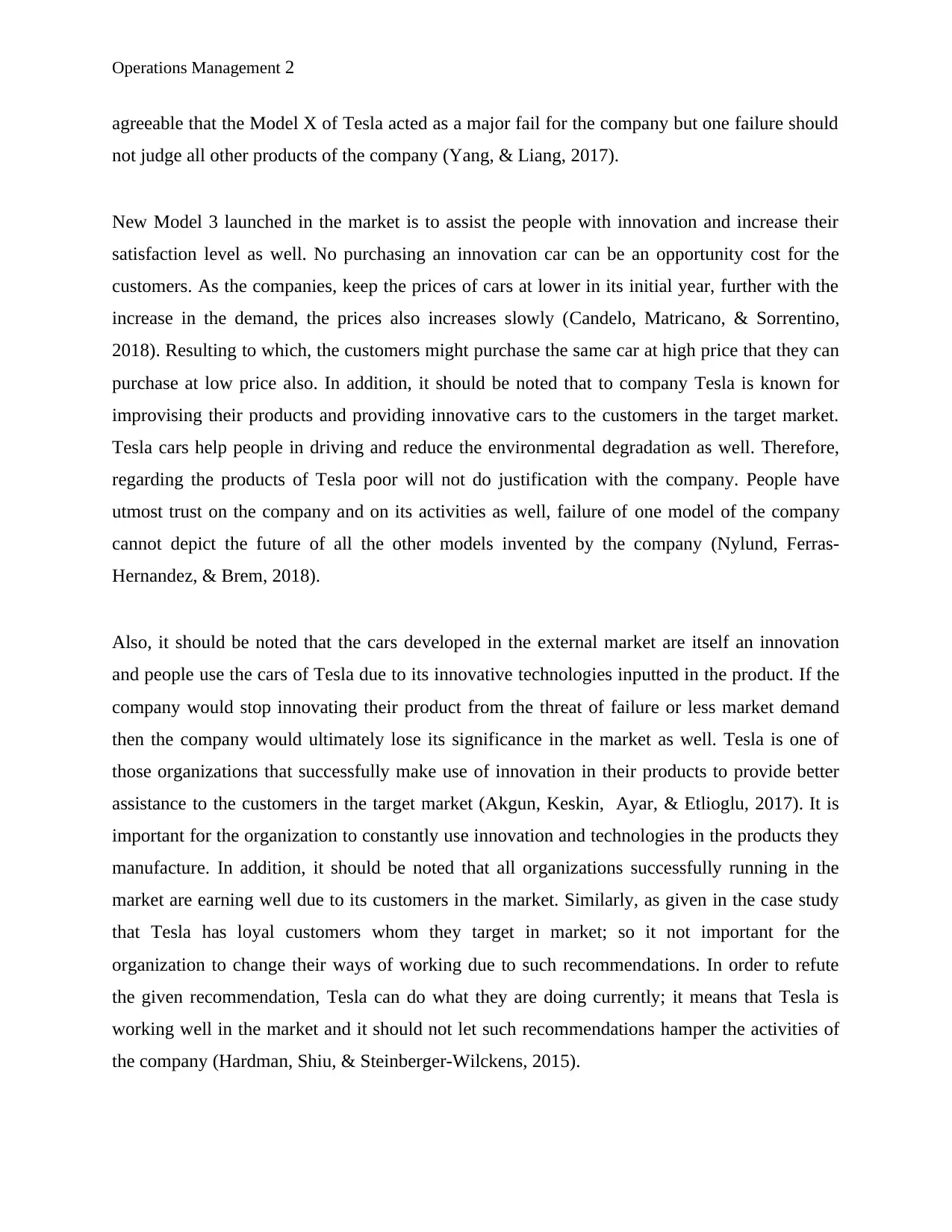
Operations Management 2
agreeable that the Model X of Tesla acted as a major fail for the company but one failure should
not judge all other products of the company (Yang, & Liang, 2017).
New Model 3 launched in the market is to assist the people with innovation and increase their
satisfaction level as well. No purchasing an innovation car can be an opportunity cost for the
customers. As the companies, keep the prices of cars at lower in its initial year, further with the
increase in the demand, the prices also increases slowly (Candelo, Matricano, & Sorrentino,
2018). Resulting to which, the customers might purchase the same car at high price that they can
purchase at low price also. In addition, it should be noted that to company Tesla is known for
improvising their products and providing innovative cars to the customers in the target market.
Tesla cars help people in driving and reduce the environmental degradation as well. Therefore,
regarding the products of Tesla poor will not do justification with the company. People have
utmost trust on the company and on its activities as well, failure of one model of the company
cannot depict the future of all the other models invented by the company (Nylund, Ferras-
Hernandez, & Brem, 2018).
Also, it should be noted that the cars developed in the external market are itself an innovation
and people use the cars of Tesla due to its innovative technologies inputted in the product. If the
company would stop innovating their product from the threat of failure or less market demand
then the company would ultimately lose its significance in the market as well. Tesla is one of
those organizations that successfully make use of innovation in their products to provide better
assistance to the customers in the target market (Akgun, Keskin, Ayar, & Etlioglu, 2017). It is
important for the organization to constantly use innovation and technologies in the products they
manufacture. In addition, it should be noted that all organizations successfully running in the
market are earning well due to its customers in the market. Similarly, as given in the case study
that Tesla has loyal customers whom they target in market; so it not important for the
organization to change their ways of working due to such recommendations. In order to refute
the given recommendation, Tesla can do what they are doing currently; it means that Tesla is
working well in the market and it should not let such recommendations hamper the activities of
the company (Hardman, Shiu, & Steinberger-Wilckens, 2015).
agreeable that the Model X of Tesla acted as a major fail for the company but one failure should
not judge all other products of the company (Yang, & Liang, 2017).
New Model 3 launched in the market is to assist the people with innovation and increase their
satisfaction level as well. No purchasing an innovation car can be an opportunity cost for the
customers. As the companies, keep the prices of cars at lower in its initial year, further with the
increase in the demand, the prices also increases slowly (Candelo, Matricano, & Sorrentino,
2018). Resulting to which, the customers might purchase the same car at high price that they can
purchase at low price also. In addition, it should be noted that to company Tesla is known for
improvising their products and providing innovative cars to the customers in the target market.
Tesla cars help people in driving and reduce the environmental degradation as well. Therefore,
regarding the products of Tesla poor will not do justification with the company. People have
utmost trust on the company and on its activities as well, failure of one model of the company
cannot depict the future of all the other models invented by the company (Nylund, Ferras-
Hernandez, & Brem, 2018).
Also, it should be noted that the cars developed in the external market are itself an innovation
and people use the cars of Tesla due to its innovative technologies inputted in the product. If the
company would stop innovating their product from the threat of failure or less market demand
then the company would ultimately lose its significance in the market as well. Tesla is one of
those organizations that successfully make use of innovation in their products to provide better
assistance to the customers in the target market (Akgun, Keskin, Ayar, & Etlioglu, 2017). It is
important for the organization to constantly use innovation and technologies in the products they
manufacture. In addition, it should be noted that all organizations successfully running in the
market are earning well due to its customers in the market. Similarly, as given in the case study
that Tesla has loyal customers whom they target in market; so it not important for the
organization to change their ways of working due to such recommendations. In order to refute
the given recommendation, Tesla can do what they are doing currently; it means that Tesla is
working well in the market and it should not let such recommendations hamper the activities of
the company (Hardman, Shiu, & Steinberger-Wilckens, 2015).
⊘ This is a preview!⊘
Do you want full access?
Subscribe today to unlock all pages.

Trusted by 1+ million students worldwide
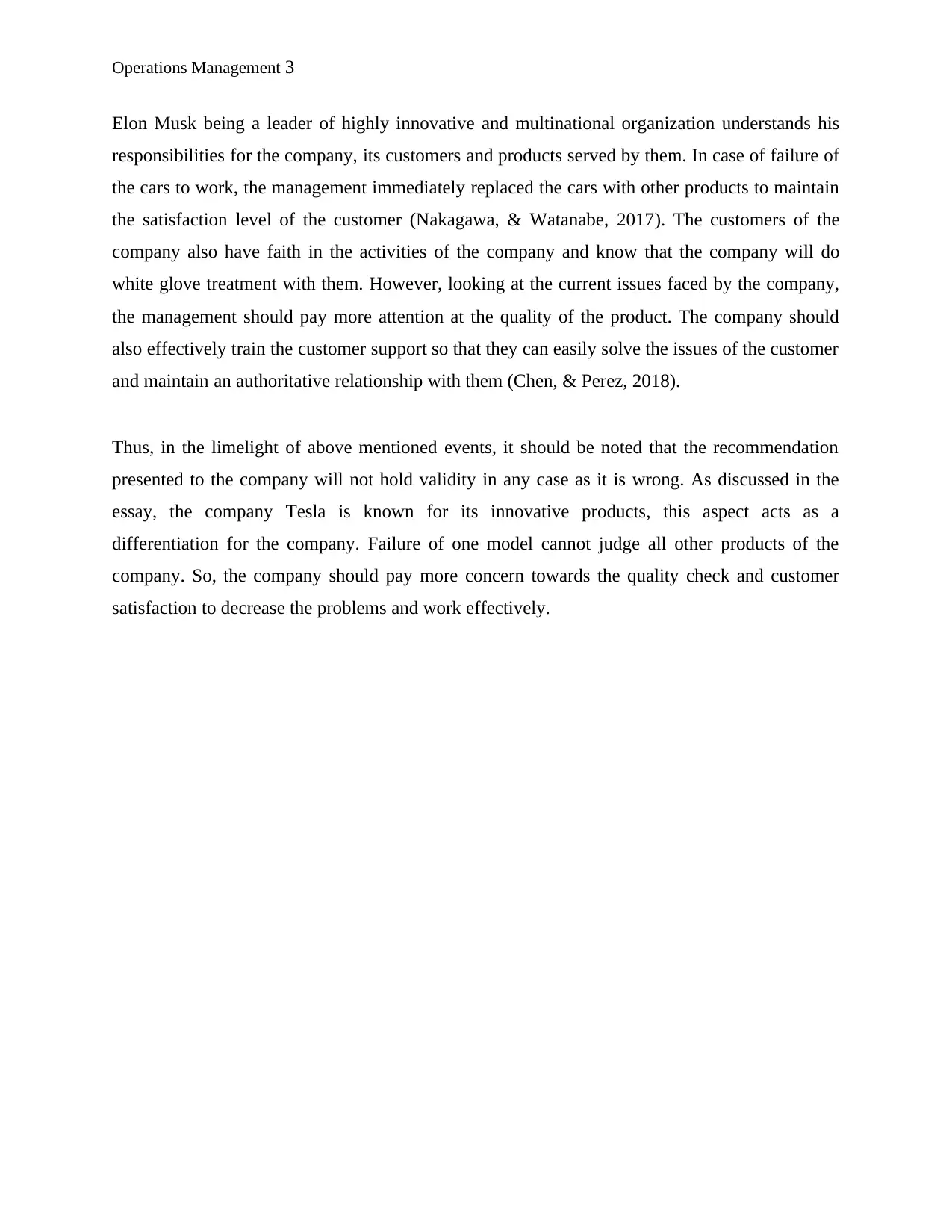
Operations Management 3
Elon Musk being a leader of highly innovative and multinational organization understands his
responsibilities for the company, its customers and products served by them. In case of failure of
the cars to work, the management immediately replaced the cars with other products to maintain
the satisfaction level of the customer (Nakagawa, & Watanabe, 2017). The customers of the
company also have faith in the activities of the company and know that the company will do
white glove treatment with them. However, looking at the current issues faced by the company,
the management should pay more attention at the quality of the product. The company should
also effectively train the customer support so that they can easily solve the issues of the customer
and maintain an authoritative relationship with them (Chen, & Perez, 2018).
Thus, in the limelight of above mentioned events, it should be noted that the recommendation
presented to the company will not hold validity in any case as it is wrong. As discussed in the
essay, the company Tesla is known for its innovative products, this aspect acts as a
differentiation for the company. Failure of one model cannot judge all other products of the
company. So, the company should pay more concern towards the quality check and customer
satisfaction to decrease the problems and work effectively.
Elon Musk being a leader of highly innovative and multinational organization understands his
responsibilities for the company, its customers and products served by them. In case of failure of
the cars to work, the management immediately replaced the cars with other products to maintain
the satisfaction level of the customer (Nakagawa, & Watanabe, 2017). The customers of the
company also have faith in the activities of the company and know that the company will do
white glove treatment with them. However, looking at the current issues faced by the company,
the management should pay more attention at the quality of the product. The company should
also effectively train the customer support so that they can easily solve the issues of the customer
and maintain an authoritative relationship with them (Chen, & Perez, 2018).
Thus, in the limelight of above mentioned events, it should be noted that the recommendation
presented to the company will not hold validity in any case as it is wrong. As discussed in the
essay, the company Tesla is known for its innovative products, this aspect acts as a
differentiation for the company. Failure of one model cannot judge all other products of the
company. So, the company should pay more concern towards the quality check and customer
satisfaction to decrease the problems and work effectively.
Paraphrase This Document
Need a fresh take? Get an instant paraphrase of this document with our AI Paraphraser
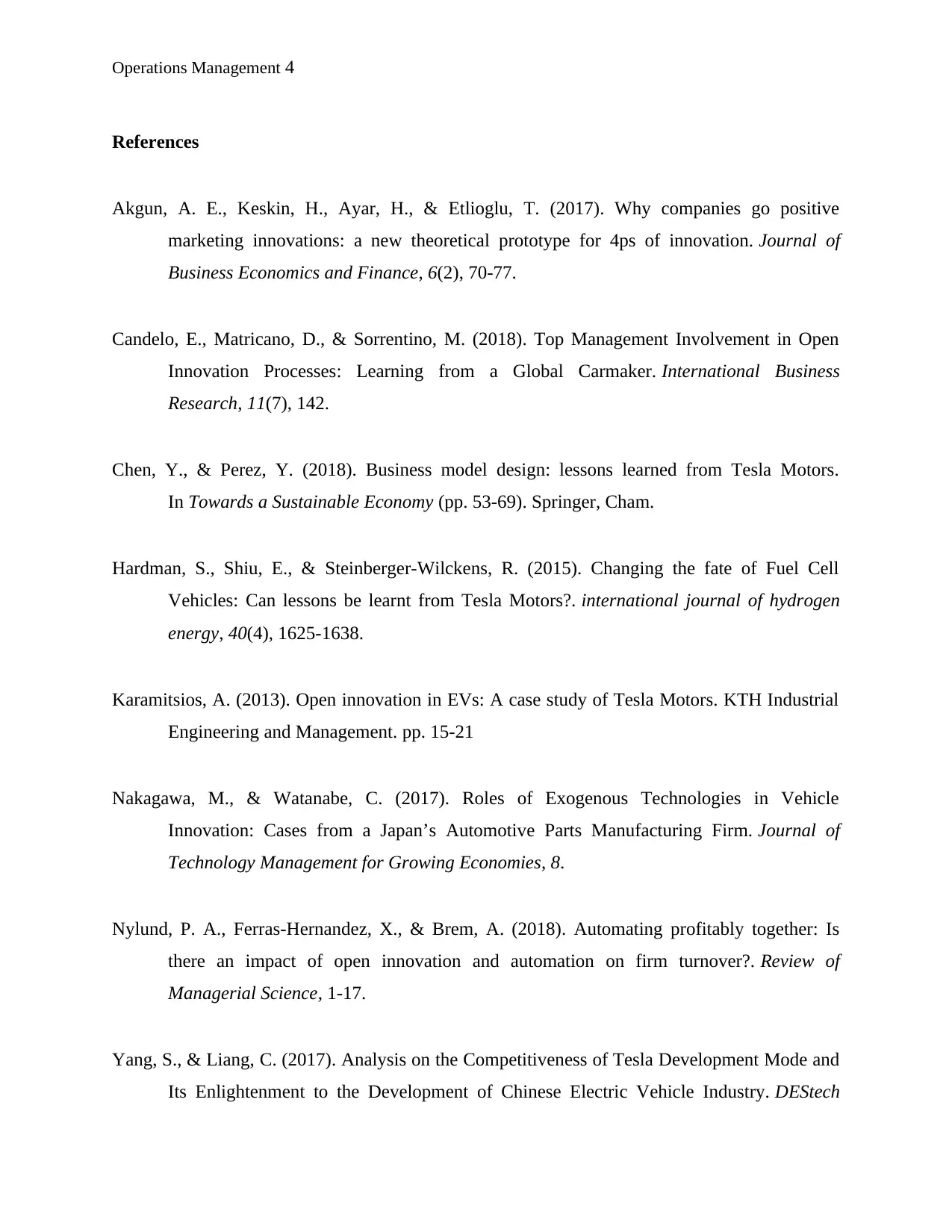
Operations Management 4
References
Akgun, A. E., Keskin, H., Ayar, H., & Etlioglu, T. (2017). Why companies go positive
marketing innovations: a new theoretical prototype for 4ps of innovation. Journal of
Business Economics and Finance, 6(2), 70-77.
Candelo, E., Matricano, D., & Sorrentino, M. (2018). Top Management Involvement in Open
Innovation Processes: Learning from a Global Carmaker. International Business
Research, 11(7), 142.
Chen, Y., & Perez, Y. (2018). Business model design: lessons learned from Tesla Motors.
In Towards a Sustainable Economy (pp. 53-69). Springer, Cham.
Hardman, S., Shiu, E., & Steinberger-Wilckens, R. (2015). Changing the fate of Fuel Cell
Vehicles: Can lessons be learnt from Tesla Motors?. international journal of hydrogen
energy, 40(4), 1625-1638.
Karamitsios, A. (2013). Open innovation in EVs: A case study of Tesla Motors. KTH Industrial
Engineering and Management. pp. 15-21
Nakagawa, M., & Watanabe, C. (2017). Roles of Exogenous Technologies in Vehicle
Innovation: Cases from a Japan’s Automotive Parts Manufacturing Firm. Journal of
Technology Management for Growing Economies, 8.
Nylund, P. A., Ferras-Hernandez, X., & Brem, A. (2018). Automating profitably together: Is
there an impact of open innovation and automation on firm turnover?. Review of
Managerial Science, 1-17.
Yang, S., & Liang, C. (2017). Analysis on the Competitiveness of Tesla Development Mode and
Its Enlightenment to the Development of Chinese Electric Vehicle Industry. DEStech
References
Akgun, A. E., Keskin, H., Ayar, H., & Etlioglu, T. (2017). Why companies go positive
marketing innovations: a new theoretical prototype for 4ps of innovation. Journal of
Business Economics and Finance, 6(2), 70-77.
Candelo, E., Matricano, D., & Sorrentino, M. (2018). Top Management Involvement in Open
Innovation Processes: Learning from a Global Carmaker. International Business
Research, 11(7), 142.
Chen, Y., & Perez, Y. (2018). Business model design: lessons learned from Tesla Motors.
In Towards a Sustainable Economy (pp. 53-69). Springer, Cham.
Hardman, S., Shiu, E., & Steinberger-Wilckens, R. (2015). Changing the fate of Fuel Cell
Vehicles: Can lessons be learnt from Tesla Motors?. international journal of hydrogen
energy, 40(4), 1625-1638.
Karamitsios, A. (2013). Open innovation in EVs: A case study of Tesla Motors. KTH Industrial
Engineering and Management. pp. 15-21
Nakagawa, M., & Watanabe, C. (2017). Roles of Exogenous Technologies in Vehicle
Innovation: Cases from a Japan’s Automotive Parts Manufacturing Firm. Journal of
Technology Management for Growing Economies, 8.
Nylund, P. A., Ferras-Hernandez, X., & Brem, A. (2018). Automating profitably together: Is
there an impact of open innovation and automation on firm turnover?. Review of
Managerial Science, 1-17.
Yang, S., & Liang, C. (2017). Analysis on the Competitiveness of Tesla Development Mode and
Its Enlightenment to the Development of Chinese Electric Vehicle Industry. DEStech
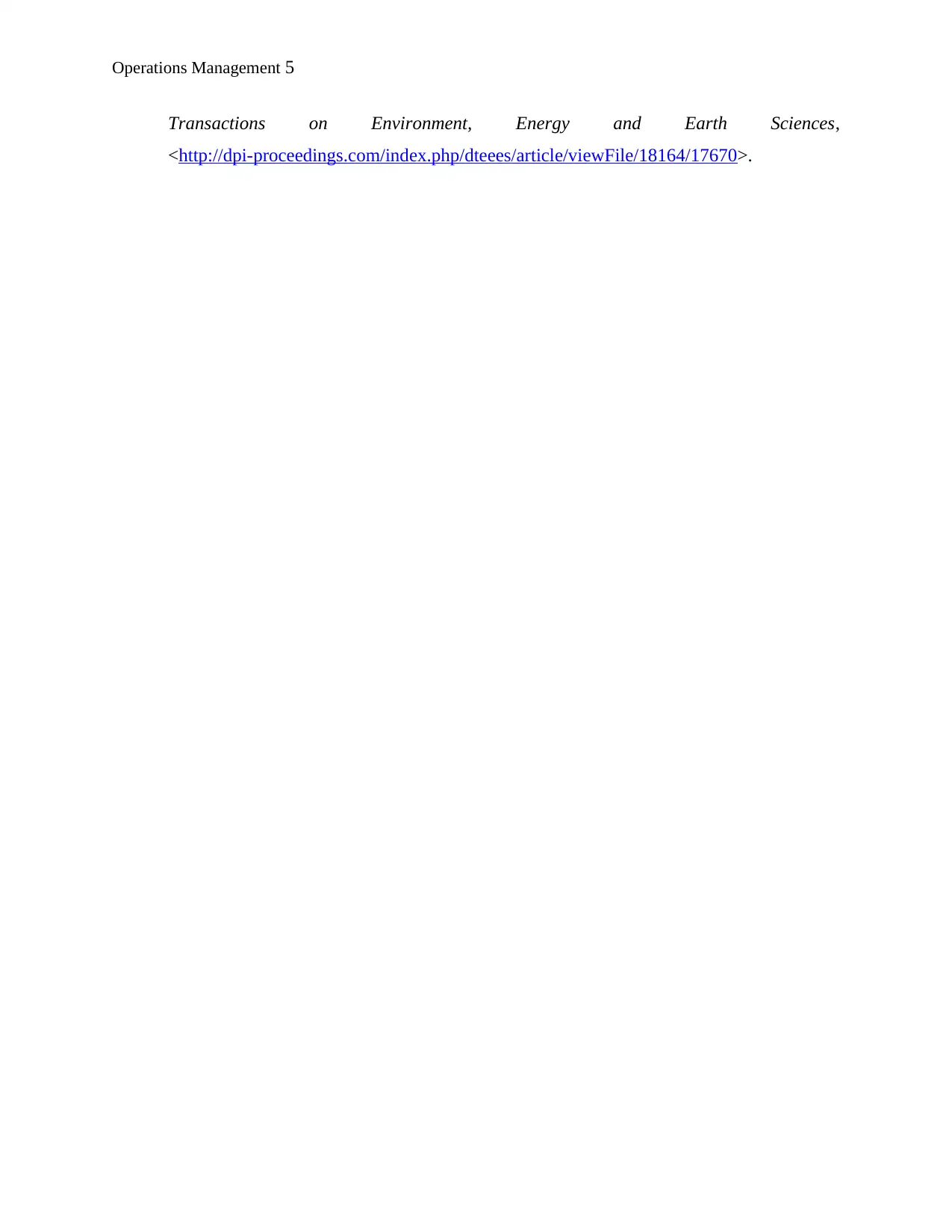
Operations Management 5
Transactions on Environment, Energy and Earth Sciences,
<http://dpi-proceedings.com/index.php/dteees/article/viewFile/18164/17670>.
Transactions on Environment, Energy and Earth Sciences,
<http://dpi-proceedings.com/index.php/dteees/article/viewFile/18164/17670>.
⊘ This is a preview!⊘
Do you want full access?
Subscribe today to unlock all pages.

Trusted by 1+ million students worldwide
1 out of 6
Related Documents
Your All-in-One AI-Powered Toolkit for Academic Success.
+13062052269
info@desklib.com
Available 24*7 on WhatsApp / Email
![[object Object]](/_next/static/media/star-bottom.7253800d.svg)
Unlock your academic potential
Copyright © 2020–2026 A2Z Services. All Rights Reserved. Developed and managed by ZUCOL.





